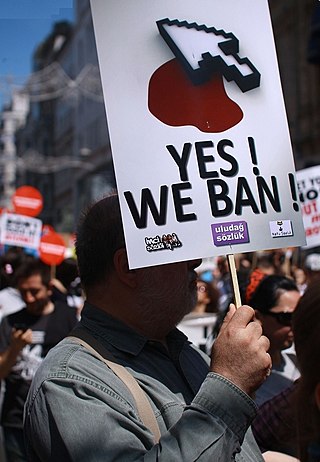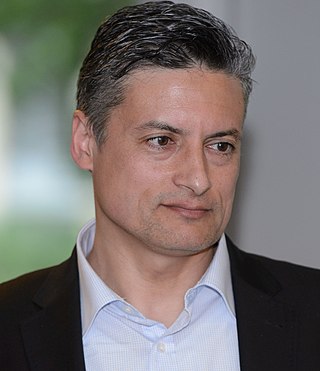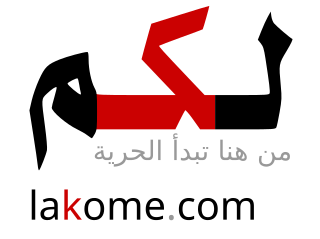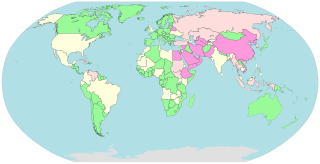
Telecommunications in Cambodia include telephone, radio, television, and Internet services, which are regulated by the Ministry of Posts and Telecommunications. Transport and posts were restored throughout most of the country in the early 1980s during the People's Republic of Kampuchea regime after being disrupted under Democratic Kampuchea.

Internet censorship in Pakistan is government control of information sent and received using the Internet in Pakistan. There have been significant instances of website access restriction in Pakistan, most notably when YouTube was banned from 2012–2016. Pakistan has asked a number of social media organisations to set up local offices within the country, but this is yet to happen.

Internet censorship in India is done by both central and state governments. DNS filtering and educating service users in suggested usages is an active strategy and government policy to regulate and block access to Internet content on a large scale. Measures for removing content at the request of content creators through court orders have also become more common in recent years. Initiating a mass surveillance government project like Golden Shield Project is an alternative that has been discussed over the years by government bodies.
Censorship in Myanmar results from government policies in controlling and regulating certain information, particularly on religious, ethnic, political, and moral grounds.

Censorship in Turkey is regulated by domestic and international legislation, the latter taking precedence over domestic law, according to Article 90 of the Constitution of Turkey.

Internet censorship is the legal control or suppression of what can be accessed, published, or viewed on the Internet. Censorship is most often applied to specific internet domains but exceptionally may extend to all Internet resources located outside the jurisdiction of the censoring state. Internet censorship may also put restrictions on what information can be made internet accessible. Organizations providing internet access – such as schools and libraries – may choose to preclude access to material that they consider undesirable, offensive, age-inappropriate or even illegal, and regard this as ethical behaviour rather than censorship. Individuals and organizations may engage in self-censorship of material they publish, for moral, religious, or business reasons, to conform to societal norms, political views, due to intimidation, or out of fear of legal or other consequences.
The Internet is accessible to the majority of the population in Egypt, whether via smartphones, internet cafes, or home connections. Broadband Internet access via VDSL is widely available. Under the rule of Hosni Mubarak, Internet censorship and surveillance were severe, culminating in a total shutdown of the Internet in Egypt during the 2011 Revolution. Although Internet access was restored following Mubarak's order, government censorship and surveillance have increased since the 2013 coup d'état, leading the NGO Freedom House to downgrade Egypt's Internet freedom from "partly free" in 2011 to "not free" in 2015, which it has retained in subsequent reports including the most recent in 2021. The el-Sisi regime has ramped up online censorship in Egypt. The regime heavily censors online news websites, which has prompted the closure of many independent news outlets in Egypt.
This list of Internet censorship and surveillance by country provides information on the types and levels of Internet censorship and surveillance that is occurring in countries around the world.
There is medium internet censorship in France, including limited filtering of child pornography, laws against websites that promote terrorism or racial hatred, and attempts to protect copyright. The "Freedom on the Net" report by Freedom House has consistently listed France as a country with Internet freedom. Its global ranking was 6 in 2013 and 12 in 2017. A sharp decline in its score, second only to Libya was noted in 2015 and attributed to "problematic policies adopted in the aftermath of the Charlie Hebdo terrorist attack, such as restrictions on content that could be seen as 'apology for terrorism,' prosecutions of users, and significantly increased surveillance."

Aboubakr Jamaï is a Moroccan journalist and banker, and was the publisher of the newspapers Le Journal Hebdomadaire and Assahifa al-Ousbouiya. In 2003, he was awarded the International Press Freedom Award of the Committee to Protect Journalists.

Lakome.com was an independent Moroccan news website. It was started in 2010 and banned in 2013.

In Russia, internet censorship is enforced on the basis of several laws and through several mechanisms. Since 2012, Russia maintains a centralized internet blacklist maintained by the Federal Service for Supervision of Communications, Information Technology and Mass Media (Roskomnadzor).
Ali Anouzla is a Moroccan journalist, known for his critical articles of King Mohammed VI's rule. Since December 2010 he has been the editor-in-chief of the online media platform Lakome, which he co-founded along with Aboubakr Jamaï. Lakome was most notably behind the uncovering of the Daniel Galván scandal in which Mohammed VI was found to have pardoned, as a gesture "demonstrating good relations between him and King Juan Carlos I of Spain" a Spanish serial child rapist sentenced to 30 years in Morocco of which he spent only a year and a half. The scandal led to unprecedented spontaneous demonstrations against the Moroccan monarch in early August 2013. On 17 September 2013, Ali Anouzla was arrested in a raid against his home in Rabat, officially for having linked to an El Pais article which contained a video allegedly posted by AQIM and hosted on the website of the Spanish newspaper. He was later charged with "Knowingly providing material assistance to terrorists acts". Many observers saw this as a revenge for the Daniel Scandal episode.
The Daniel Galván scandal was a political scandal in which Mohammed VI, the King of Morocco, issued a pardon for a Spanish convicted serial child-rapist named Daniel Galván. The Spanish citizen was serving a 30 years prison sentence. He was arrested in Morocco in late 2011, for having raped at least 11 Moroccan children in Kenitra—a city he had been living in since 2004. The pardon came some 18 months after his incarceration as part of a diplomatic gesture from Mohammed VI to Spain, on the occasion of the 14th anniversary of his enthronement. The pardon sparked unprecedented popular outrage in Morocco where several protests were held denouncing the monarch's decision. This prompted Mohammed VI to first issue a communiqué in which he denied being "aware of the gravity of the crimes committed by Daniel Galvan", then to "cancel" his pardon but only after the Spanish citizen had already left the country several days before on an expired passport—with the knowledge of Moroccan authorities. It was revealed later that this was not the first time Mohammed VI had pardoned a convicted foreign paedophile, having pardoned Hervé Le Gloannec, a French citizen convicted of child rape and child pornography in 2006.
Internet censorship in Switzerland is regulated by the Federal Supreme Court of Switzerland on a case by case basis. Internet services provided by the registered with BAKOM Internet service providers (ISPs) are subject to a "voluntary recommendation" by the Federal Supreme Court of Switzerland, which requires blocking of websites just after 18 December 2007. As of October 2015, this might change soon and additional topics like Online gambling are on the focus now.

This list of Internet censorship and surveillance in Europe provides information on the types and levels of Internet censorship and surveillance that is occurring in countries in Europe.

This list of Internet censorship and surveillance in Asia provides information on the types and levels of Internet censorship and surveillance that is occurring in countries in Asia

This list of Internet censorship and surveillance in the Americas provides information on the types and levels of Internet censorship and surveillance that is occurring in countries in the Americas.

This list of Internet censorship and surveillance in Africa provides information on the types and levels of Internet censorship and surveillance that is occurring in countries in Africa.

Omar Radi is a Moroccan investigative journalist and human rights activist. He has worked at Lakome, Atlantic Radio, Media 24, TelQuel and Le Desk and volunteered for the citizen media Mamfakinch, focusing on investigations about human rights, corruption and social movements. He was detained in Casablanca on 26 December 2019 for criticizing a judge in a tweet posted six months earlier. His arrest triggered a movement of solidarity among his sympathizers. He was handed a suspended four-month prison sentence, a verdict criticized by some NGOs and human rights groups.










